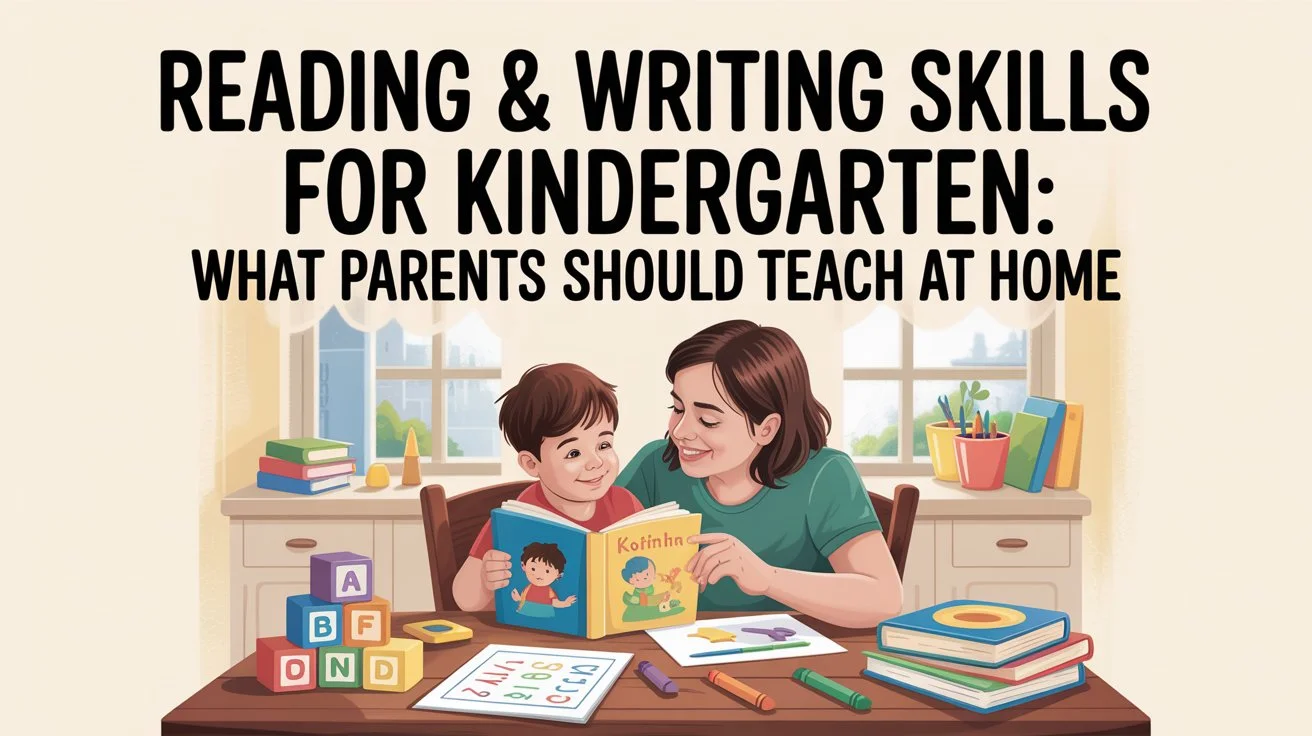Reading & Writing Skills for Kindergarten: What Parents Should Teach at Home




Developing Reading & Writing Skills for Kindergarten is one of the most important steps for a child’s academic journey. Parents often wonder about the reading skills for kindergarten and the fastest way to improve reading level, especially when learning begins at home before it reflects in school.
In truth, kindergarten literacy grows best when learning is simple, joyful, consistent, and full of real-life interactions.
Reading and writing begin long before a child touches a pencil or opens a book. Kindergarten is the stage where children build pre-literacy foundations such as listening, speaking, recognizing sounds, and enjoying books.
To Know more about Kindergarten Readiness, check out the blog given below,
Strong kindergarten reading skills help children:
Students who develop reading early often show higher confidence and better performance in Grade 1 and beyond.
Parents often ask for the fastest way to improve reading level for their child. The truth is simple: daily short practice works better than long, once-a-week sessions.
The ability to hear and play with sounds in spoken words.
Connecting letters with the sounds they make.
Learning new words through conversation and reading.
Recognizing common words without decoding.
Writing at this age isn’t about perfect spelling it’s about expressing ideas.
Also know What Should a Child Know Before Kindergarten,
Activity | Time Needed | Benefit |
| Picture walk through a storybook | 3 mins | Builds prediction skills |
| Phonics flashcards | 5 mins | Improves sound recognition |
| Reading aloud | 10 mins | Builds fluency |
| Talking about the day | 5 mins | Expands vocabulary |
Reading Activities for Kindergarten | Writing Activities for Kindergarten |
| Sound hunts (“Find something that starts with S”) | Sand writing |
| Letter matching games | Playdough letter shapes |
| Rhyming word play | Tracing worksheets |
| Story retelling | Drawing and labeling |
Know about the 10 Essential Kindergarten Readiness Skills Parents Often Overlook,
Ask your child:
Every child deserves a joyful and meaningful beginning to their learning journey, and that’s exactly what the Intervals Kindergarten Program is built for.
With a carefully designed curriculum focused on strengthening early reading, writing, communication, and cognitive skills, Intervals helps young learners grow with confidence, curiosity, and joy.
Our Kindergarten program blends playful learning with structured literacy foundations, ensuring children master essential skills while enjoying every step of the process.
Give your child the best start with Interval Learning's Kindergarten Program, where strong reading and writing are built through joyful learning.
Join now at Interval Learning’s Online Kindergarten Program and make your child confident.
Most children begin developing reading readiness between ages 4–6, but exposure to books and conversations from earlier ages helps significantly.
A short 10–12 minutes of daily reading is more effective than long, occasional sessions.
Daily practice with phonics, picture books, and simple sight words helps children progress quickly.
Offer tracing worksheets, practice name writing, encourage drawing, and strengthen fine motor skills through play.
Use playful methods like alphabet puzzles, sensory letters, or magnetic letters to reinforce learning gently.
Yes. Intervals provides short, targeted activities that build reading fluency quickly without overwhelming the child.
It is both—a balanced approach that uses play to teach essential reading and writing skills in a fun, meaningful way.